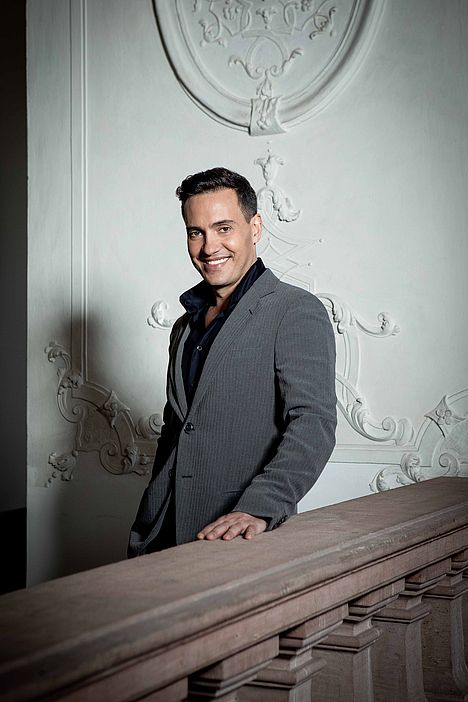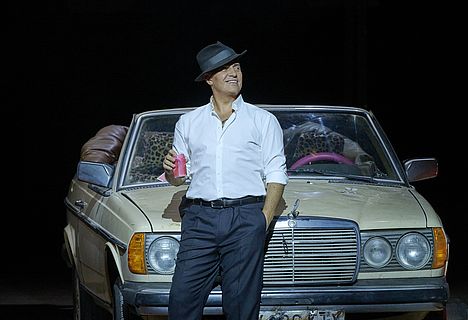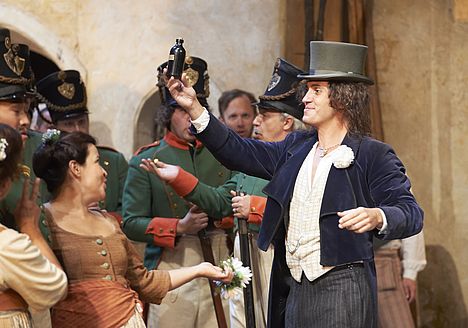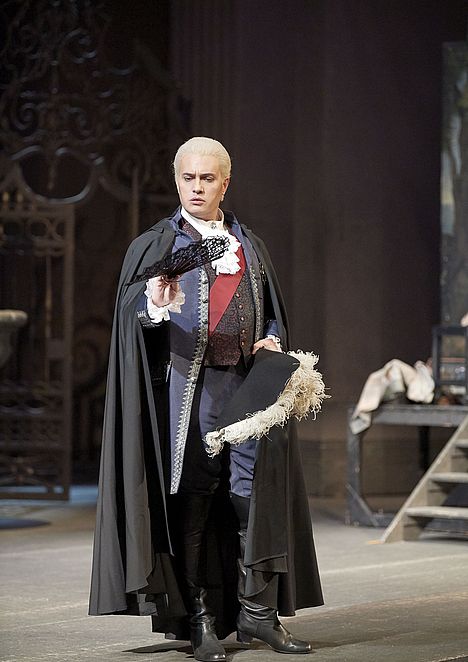



Magic realm of opera
Magic realm of opera
OL You sang the role of Procida for the first time over ten years ago. So, the character is an old familiar one.
ES Ten years is basically nothing to develop a complex character like Procida, and to craft the technic to sing the brilliant music written by Verdi. Since the beginning of navigating this masterpiece, I’ve already took the choice to focus on my repertoire and to carefully chose the operas I’ll sing in the present and in the future. Carefully selecting a repertoire, with precision and humility, has been a guiding light since the beginning of my career. This approach offered me the opportunity to dive deeper into each musical nuance, and I spend time to meticulously craft every word like the time it is required to shape a diamond. This is my philosophy in my work, to make each performance a unique experience for the audience. These artistic choices are inspired by my own experience and by the wisdom of artists from the past and has become a pilar in my decisions, shaping not only my vocal journey but also the connection, respect, empathy and understanding while interpreting characters like Procida, Scarpia, Méphistophélès or the ones that are coming. I always wanted to keep my voice healthy while still being able to give my 100% in every show, for that I need and want lots of quality time to study. Even when I think I’m on the right path, I will probably start all over again to get out from my initial comfort zone and discover new possibilities. There’s always room for improvement, so there’s always the need to study, study and study.
OL What did Procida teach you as a stage character?
ES In Procida, I found a force, an inspirational figure, a revelation that goes beyond historical confines and explores into the heart of the human spirit. Procida’s character, beyond a historical figure, was someone that gave everything for justice and freedom. The meaning of freedom and justice didn’t change much in time and still now a days people will give everything for the sake of it. He could perfectly have a very exposed role in our contemporary world. Giovanni da Procida was born in Salerno and was a fascinating figure from medieval times and he wasn’t just a physician; he became the personal doctor to King Frederick II. and he as well knew how to navigate the complex world of medieval politics. He lived a long and interesting life as a physician, as a strategist, as a political figure, traveling between kingdoms and making things happen. Some people saw him as a genius, while some others were not a big fan of his. Whether we perceive him as a political guru or a strange character, Procida was without a doubt a key player in a period of time that left a mark on the world we live today and the opera I vespri siciliani, a testament to Verdi’s genius that transcends time. Procida was an incredibly interesting human, and through my search to understand and learn about him, very interesting historical layers unveiled in front of my eyes, that made clear for me his motivations for fueling this revolution enthusiasm. I started to find parallels between the challenges of our present times and those times, making this character as alive today as it was before. With the words of his initial “O tu, Palermo”, which epitomized the love and pride for one’s country and culture, Procida’s spirit gets introduced into the drama. And I realize that we could easily found people with the same principles in our present times, and this makes clear that the search of justice and freedom its an eternal torch that with its light keeps illuminating our whole existence since always.
OL There is a French and an Italian version of the opera. What are the strengths of the Italian version?
ES I invite the reader to dive in both by immersing themselves in the French and Italian versions. I invite you all to experience the unique linguistic journey in each rendition, allowing both, Italian and French versions to shape the emotional surprises. Invite your ears to discern and discover the nuances, you’ll discover that it’s not about one being better or stronger; it’s about the magical dance between words and music. The Italian version, with its passionate resonance, may draw you into a different emotional cadence compared to the French rendition, where linguistic subtleties create a different melody. So, savor both versions, letting the beauty of language and music blend, offering a symphony of differences that will enrich the final experience.
OL There are not one or two main characters in this opera, but four. Does that mean anything to you? In the sense that you have to act more in a network.
ES Teamwork makes the dream work and for me this plot it has a very captivating effect, like a heist movie, like Ocean’s Eleven for example. In Vespri you’re introduced into a world where each character, brings something special to the table. There’s the noble and compassionate Elena, the passionate and idealistic Arrigo, the conflicted and emotional Monforte, and the vengeful, retaliatory, calculative and morally ambiguous Procida. Each of them contributes with their emotions, feelings and skills to pull off a brilliant story. But the real magic lies in the collaboration of these characters, working together like a well-oiled machine. I think of I vespri siciliani and I realize how wonderful the plot is, so contemporary that we could easily find now a days references from our socio-political milieu. The only difference between any good heist movie and I vespri siciliani, is that at the opera, the actors can as well sing, and how! (Laughs) Each live performance is like a travel machine that allows us to make history alive in front of our eyes, and this could be giving us the opportunity to don’t make the same mistakes and to improve our present and hopefully our future. In the words my beloved author Isaac Asimov, "The saddest aspect of life right now is that science gathers knowledge faster than society gathers wisdom".
OL You sang the shepherd boy in Tosca at the age of nine, opera was and is your destiny. But what is the purpose of opera? Is it to entertain people? To lead them into new worlds of thought? To have a political impact?
ES Opera is a universal and massive force that transcends the confines of simple entertainment. Personally, opera has been, and it is a transformative journey, the beginning of everything, it casted a spell that extends beyond the proscenium and beyond the scores. This spell took over my whole existence carving so much space within the chambers of my own intellectual growth creating an echo in those empty spaces that was repeating a simple refrain “fill me with music, with the love and respect for it”. From my introduction to opera, guided by the hands of my mother, everything shifted, because I stepped onto the stage at a tender age but rather due to the profound impact it had on me. Opera served as a catalyst for monumental changes, opening doors not just in my universe but also for those surrounding me. The sky and its music dispersed the clouds of adversity and illuminated hidden corners. It revealed countless stars, each holding a universe of knowledge, introducing me to brilliant individuals, wisdom, and questions with answers waiting to be sought. Each star formed a constellation, leading me to so many authors, writers, poets, painters, sculptors, and every one of them, in turn, crafted worlds within my imagination. This is the gift that opera had ready for me, and it is a gift that I love to share with everyone that wants to take the chance of being introduced to the best and most complete art form.
OL A universal art, in other words.
ES Opera’s gift is universal, a treasure awaiting us all. Patience, attentive listening, humility, and setting free our imagination is the key to rediscovering its limitless nature. I am convinced that reinforcing your resilience against external labels, avoiding gossip, and prioritizing personal growth are key to unlocking this door. Embrace the journey of uncovering truths, connecting with individuals, exploring preferences, and delving into the richness of life through opinions shaped by your unique experiences. For me, opera helps us to connect with all the facets of the human experience, and I perceive it as a gigantic door that open so many valuable information that it is not as polluted as the misinformation given to us by the casual entertainment that we are being fed with. For me It has been a catalyst for self-discovery and self improvement. Each performance it works as a cultural mirror or perhaps I should say kaleidoscope, not only because what’s happening on the stage, but as well what’s going on behind the scenes, reflecting aspirations, conflicts, and the complex mosaic of our shared reality. Opera has changed my awareness of the world in profound ways, about human condition, societal dynamics. It has been a passport to dimensions of thought and emotion that were previously hidden, a journey through cultures and historical epochs that enriches my perspective on the world we live in.
OL You once said that music is a passport to freedom. For which freedom?
ES Music opens doors to a multi-dimensional liberation. This freedom is not confined to external chains but rather unfold within our emotions and the unknown horizons of the human spirit. The freedom I made reference to, is a freedom that music can only provide and that transcends the barriers of the physical world. A freedom that immerses us in the world of imagination, where our mind wanders through a Magritte like universe created with the vivid tones of sound. In the world of music, freedom takes on diverse forms. It’s the freedom to express, allowing emotions to flow unrestricted. The exuberance of joy, the depths of sorrow, or the quiet introspection of contemplation, every emotion its free and acceptable. It’s the freedom to connect, creating links that transcend languages and cultures. It creates a universal language that resonates with all hearts across the globe. The freedom that music unlocks is a journey inward, a pilgrimage to the core of our own being. It is an inspired and illuminated place to rest, where the harmonies and melodies become the guiding lights, leading the way to the immense extension of the human spirit. In that passport I’ll write a simple quote from Beethoven that says: “Don't only practice your art, but force your way into its secrets, for it and knowledge can raise men to the divine.” And who knows, perhaps through the divine we will as well achieve that freedom that I am referring to. Want a clear example of that passport? A seven-year-old kid from Uruguay, washing cars in the night with his father to bring food to the table, while listening to Wolfgang Amadeus Mozart and dreaming about one day singing his music in Vienna. My parents saw me several times performing at the Staatsoper in Don Giovanni and Le nozze di Figaro. I’ve got my passport.
OL What about musical freedom? How much freedom do you allow yourself? Today we are quite strict when it comes to "faithfulness", are we too strict?
ES Musical freedom needs to meet a respectful balance between honoring the composer’s intentions and allowing some interpretative creativity. While it’s a must to respect the composer’s wishes, being too pedantic or overly rigid with conventions could be a risk. I think it is fair to find a ground where faithfulness to the original could coexists with the interpretative freedom that breathes life into the performance. The question of whether we are too strict in today’s approach to "faithfulness to the original" is a subjective one. The audience, with their diverse perspectives and tastes, is the ultimate arbiter of what is doable and acceptable. Arriving to this balance perhaps could ensure a dynamic musical scene that respects both tradition and innovation. Artists must delicately navigate these waters, above anything understanding and studying the original composition, to then perhaps infusing it with their unique artistic view. Before making any decision, having a civilized dialogue, and sharing ideas with the conductor and the musical department of the theater is always advisable.
OL What about freedom on stage? Do you sometimes come up against limits?
ES Navigating the stage involves a logical interplay between artistic freedom and the parameters intrinsic to the performance. When artists come up against limits, should not be seen as an obstacle but rather as an important part of the creative journey. The delicate interaction between the performer freedom, shaped partially by the risks they take and their unique vision of a part, role, or character, and the structured parameters set by the score and storyline, when is harmonized with the conductor’s musical insights and the director’s vision, the whole becomes a freedom that becomes magic. Exploring freedom only through the lens of individual free will, making decisions in isolation from external influences and neglecting the collaborative dynamics with other stage partners, doesn't align with the kind of constructive freedom I value on a cooperative level. On the other hand, I find it equally unconstructive to dismiss others’ ideas or dismiss other people risks because of our own fear of not being able to handle someone else’s talent, and this undermines the potential for positive collaboration. Embracing others’ ideas and acknowledging their risks creates an environment where collaborative synergy flourishes, leading to better outcomes. True freedom, when associated to the ability to act in harmony with rationality and common sense, will always influence the dynamics on the stage in a positively way. This means that having the freedom to act doesn’t necessarily translate to showcasing every spontaneous idea without consideration. It’s about exercising good taste and analyzing the impact of one’s actions on the collaborative performance, avoiding arbitrary choices solely for attention’s sake. I like to keep always present the Stanislavsky method and stay focused on the character inner emotional life and creating a psychological authenticity. Freedom during the performance, for me, comes from the ability to connect with genuine emotions and create real life interactions, providing a truthful portrayal of a character. Except in one-person shows, performers do not act alone; they interact with other people and all action onstage must have a purpose. With this obvious remark, and if everyone has the minimum interest and good attitude towards acting and towards the creative process, this should allow everyone to enjoy a safe and creative environment for gifted performers to give a natural and intuitive rendition of their parts. Focusing on what they can do instead of what others are doing, and at the same time learning and interacting while others are on the creative path. Something that I find very important about acting, is that it’s not enough to emphasize only the high points of a performance, while the rest it looks like the life of the character stops. In real life, people don’t stop living.
OL One gets the feeling that you are an incredibly precise, focused person on stage. Is that consciously learnt?
ES I’ve learned various techniques, but the precision and focused goes hand by hand with my intuition and the big number of hours I practice per day. I like to combine the teachings of Stanislavsky’s System with practical techniques based on my own experience. Emotional memory and sensory awareness have become part of me being on the stage and helps me to channel precise emotions. Laban Movement Analysis have helped me to have a better perspective on my movements and understanding my own physical expression on stage. Recently, I started working on the Meisner Technique to focus on truthful and spontaneous reactions. It’s a technique that I’ve found immensely helpful, and I’d recommend it to whoever is seeking authenticity in their performance. I perceive each performance, whether on stage or on screen, as a possibility for learning, to adapt, to grow, and to always integrate new approaches.
OL At the beginning of your career, Mirella Freni advised you to be patient. What advice do you have for young singers today?
ES Patience is your greatest ally, and it’s one of the most important keys in almost anything because patience if the bigger sister of humility and humility is the passport towards personal growth. Take lots of time to refine your skills, treating each practice session at home with the same energy you’ll bring to the stage. Expand your horizons by seeking guidance from not only fellow singers or musicians but also from intelligent and inspiring individuals in other areas. Invest in your education, not just in music, but in various aspects of life. Dedicate time to meditation, engage in physical activities, and revisit your books and exercises during your free moments. Equip yourself with financial literacy, understanding how to manage and gradually invest in your future. Life is unpredictable, no one can guarantee a long and successful career. It depends a lot on your relentless efforts, coupled with a dash of luck. The only real way to sculpt our journey is with our dedication, resilience, and the willingness to adapt. Avoid the inclination to criticize individuals who have achieved success and keep away of the allure of gossip. Engaging in gossip can gradually obscure potential opportunities and serve merely as a reflection of one’s own uncertainties and perceived as a lack of talent and personality. On the other hand, understand that as your success grows, so does the accompanying chatter and gossip, learning how to navigate and stay away from this phenomenon is a good exercise for your mental health. Extract valuable lessons from those making significant contributions to our society, as their insights are invaluable and contribute to your personal growth. Keep in mind that achieving success doesn’t need compromising any aspect of yourself – neither your soul nor your body. Uphold your values, acknowledge small triumphs, and when significant milestones arrive, celebrate them by contributing to charitable causes. Maintain a realistic outlook on your goals; while dreaming is commendable, understanding your true worth is part of your capital. Persist in studying, use all your time to refine your craft. One single quote from the genius Isaac Asimov reflects my whole philosophy: “People think of education as something they can finish”. We never finish, use your time wisely. Last but not least, recognize that your personal life doesn’t need not be introduce to the public eye. Instead, focus on sharing aspects of your artistic journey rather than divulging intimate details. Treat social media as a tool to amplify your presence as the artist you claim you are. I wouldn’t turn it into a platform for showcasing physical attractiveness; after all, opera isn’t a runway show. Your artistry should take center stage, emphasizing the beauty of your singing, your voice and performance rather than your physical appearance. Opera is about singing and storytelling, not a showcase of physical allure. If you are attractive, or charismatic, intelligent, or talented, people will notice without you having to expose it.